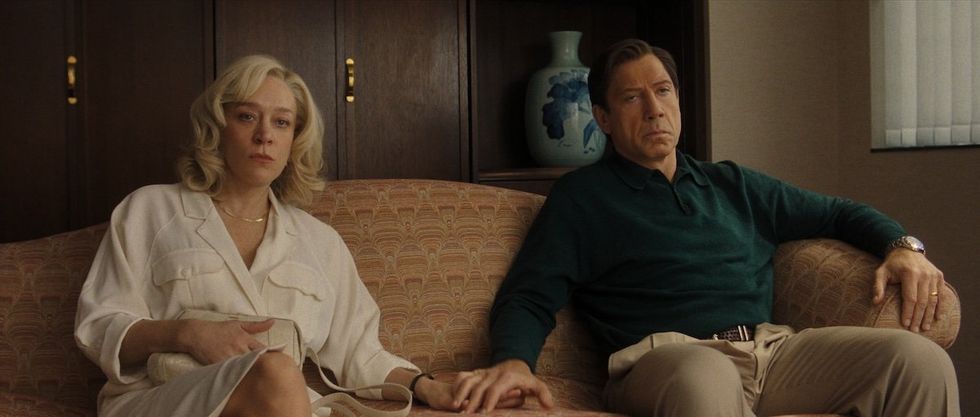There’s a breathtaking episode in Monsters: The Lyle and Erik Menendez Story that consists of a single 33-minute shot of the camera closing in on actor Cooper Koch as Erik detailing the abuse he endured from his father and brother to his defense attorney Leslie Abramson (Ari Graynor). In the episode titled “The Hurt Man,” written by Ian Brennan, Abramson’s voice can be heard questioning him while the viewer only sees her from the back. That is, until the camera pushes in so close that she’s out of the frame entirely and only Koch’s Erik speaks directly to the camera, and by extension, the viewer.
This season of Ryan Murphy’s anthology series Monsters has received criticism for taking liberties with and exploiting the true story of the brothers who were convicted of murdering their parents, Jose and Kitty Menéndez (Javier Bardem and Chloë Sevigny in the series), in 1989. The true story offers a jumping-off place for the series to delve into serious topics around homophobia, HIV and AIDS stigma, cycles of abuse, the limitations of the justice system to fully arrive at a truth, and celebrity.
“The process of getting ready to do ['The Hurt Man' episode] was really just reading that script over and over and over again. I read it every day, and I tried to just really get all of those memories so specific and detailed so that when I was going to recount them, it was real for me,” Koch tells Out.
The series tells the story of the Menéndez murder from multiple perspectives over nine episodes, giving voice to the brothers, their parents, and even Dominick Dunne (Nathan Lane), the writer whose daughter Dominique Dunne was murdered in 1982 and who wrote prolifically about the Menéndez case. There has been plenty of online discussion about how the show’s incestuous scenes between the brothers that appear to be a call-out to the famed murderous Papin sisters, who became the subject of gay author Jean Genet’s 1947 play The Maids. At one point, the brothers are seen holding a book about incestuous, murderous siblings.
While detailing cycles of abuse in “The Hurt Man” at the hands of his brother and father and his complicit mother, and the grandparents who allegedly abused Jose and Kitty, Erik explains that he’s engaged in a rewarding physical relationship with another boy but admits he doesn’t understand his sexual identity because of what was “done” to him by the abuse he suffered.
“In terms of not knowing who he was or this boy that he speaks on at the end of the episode, I really think it's in there to present what’s called traumatic reenactment, which is when you’ve been through sexual abuse or really any kind of abuse and you keep going back to something that’s similar or familiar to you as a way to heal or cope,” Koch says. “I think having that in there proves and further supports their claim that they were in fact sexually abused. And I hope that after that episode, people really sympathize with him and believe his story.”
 Chloe Sevigny and Javier Bardem in Monsters: They Lyle and Erik Menendez StoryCourtesy of Netflix
Chloe Sevigny and Javier Bardem in Monsters: They Lyle and Erik Menendez StoryCourtesy of Netflix
Another social ill, institutionalized toxic masculinity, fuels Bardem’s, at turns, charming and terrifying Jose.
“I think it comes with the time where the educational pattern that these people had and where a man is a man and you cannot express any emotion and you can’t share your weakness. And of course all that stupidity that comes with it, and that creates so much harm around him,” Bardem says. “There's still something in our education [of men] that is so wrong, and I think Jose Menéndez is an example of that.”
As for Kitty, who admits to hating her sons in a fiery episode, Sevigny sees her character as a product of a time that included stifling gender roles, and so her admission of failing to love her children is all the more shocking.
“I think Kitty was jealous of her sons, of the attention that they got from her husband. I think she has a lot of very old-fashioned values and really played into gender roles and was also threatened by them and their physicality. I think that she was very unhappy in her life and her marriage, very unfulfilled, and turned to drugs and alcohol,” Sevigny says. “A lot of women during parenthood have different stages of it where it can be very confusing and disruptive and disturbing even, especially when you have sons that you’re scared of in her case, or at least in the story that we're telling in her case,” she adds. “I think a lot of women don't admit that even postpartum is very hard for people to talk about. I know a lot of women in my life that had a really hard time connecting with their children. And I think it's just something that people don't address.”
 Nicholas Alexander Chavez and Cooper Koch in Monsters: The Lyle and Erik Menendez StoryCourtesy of Netflix
Nicholas Alexander Chavez and Cooper Koch in Monsters: The Lyle and Erik Menendez StoryCourtesy of Netflix
Graynor’s strong, successful Abramson is a counterpoint to Kitty’s succumbing to gender roles in the series.
“She was a woman of her time where the most frustrating thing somebody could say to her was calling her a ‘female attorney.’ She was coming [up] of an age and was a feminist in her own [way] without wanting to carry the card In that way,” Graynor says. “She was sort of like, I’m here because I’m a good lawyer. And yet I think that it comes up in the show. People then and people now, and certainly in our world, still have a really hard time with powerful, outspoken women.”
In another powerful scene describing abuse, Nicholas Alexander Chavez’s Lyle breaks down on the stand, only to flip into what appears to be a kind of sociopathy once the judge and jury are out of the picture. He boasts about his performance on the stand to a woman he’s dating from prison.
“There is evidence to support that. Lyle Menéndez essentially, after he gave his testimony in the first trial, said something to the effect of, ‘I can't believe that I snowed them,’” Chavez says.
Part of Chavez’s work in playing the character was to find those places of empathy.
“It was important to me to do a lot of work on why he behaved so erratically and impulsively at times. And I think it stemmed from being a really, really deeply hurt and wounded child underneath. I think that he felt a tremendous amount of pressure to lead his brother through this. And as part of leading his brother through this, mimicked many of the behaviors of his own father, which is why my performance became so much clearer once Javier Bardem came into the picture,” Chavez says.
“Because I think that Lyle Menéndez is first and foremost his father's son, and I was really grateful for the scenes… where you really get a chance to see Lyle's inner child and the place of hurt that he comes from, and maybe gives some sort of insight into why he behaves the way that he does in the other episodes.”
Watch Out’s interviews with Koch and Chavez and Bardem and Sevigny in the video above. Monsters: The Lyle and Erik Menendez Story is streaming on Netflix.



 Chloe Sevigny and Javier Bardem in Monsters: They Lyle and Erik Menendez StoryCourtesy of Netflix
Chloe Sevigny and Javier Bardem in Monsters: They Lyle and Erik Menendez StoryCourtesy of Netflix  Nicholas Alexander Chavez and Cooper Koch in Monsters: The Lyle and Erik Menendez StoryCourtesy of Netflix
Nicholas Alexander Chavez and Cooper Koch in Monsters: The Lyle and Erik Menendez StoryCourtesy of Netflix 


































































Charlie Kirk DID say stoning gay people was the 'perfect law' — and these other heinous quotes